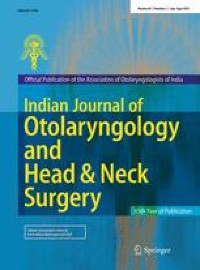Predictors of a Normal Sleep Study in Healthy Children with Sleep Disordered Breathing Symptoms.
Ann Otol Rhinol Laryngol. 2021 Feb 05;:3489421990156
Authors: Abraham EJ, Bains A, Rubin BR, Cohen MB, Levi JR
Abstract
OBJECTIVE: To determine the prevalence and characteristics of children with normal elective polysomnography for obstructive sleep disordered breathing (oSDB) based on the American Academy of Otolaryngology-Head and Neck Surgery (AAO-HNS) guidelines.
STUDY DESIGN: In this retrospective cohort study, we identified patients ages 2 to 18 who underwent diagnostic polysomnography (PSG) ordered by our otolaryngology department for SDB between 2012 and 2018.
SETTING: All patients were seen by otolaryngologists at an urban tertiary safety net hospital.
SUBJECTS AND METHODS: There were a total of 456 patients studied (average age 5.66 ± 3.19; 263 (57.7%) males, 193 (42.3%) females. Demographic factors (age, gender, race, ethnicity, language, insurance status) and clinical findings (symptom severity, tonsil size) were recorded. The data were analyzed by univariate and multivariate analysis.
RESULTS: Two hundred four patients (44.7%) had no obstructive sleep apnea (OSA) based on AHI<2 on PSG. Children with a larger tonsil size had 3.18 times the odds of OSA compared to those with a medium tonsil size (95% CI 1.64, 6.19) when adjusting for symptoms, age category, and race (P = .0007). Children ages 4 to 6 years had 0.25 times the odds of OSA compared to those ages 2-3 years (95% CI 0.12, 1.54) when adjusting for symptoms, tonsil size, and race (P = .0011). White children had 0.28 times the odds of OSA compared to Black children (95% CI 0.14, 0.57) when adjusting for symptoms, tonsil size, and age category (P = .0004).
CONCLUSION: Among our patient population, 44.7% had normal sleep studies. Younger children (ages 2-3) were less likely to have normal polysomnography. This research demonstrates that obtaining sleep studies in otherwise healthy children with SDB can affect management decisions, and they should be discussed with families with a focus on patient centered decision making.
PMID: 33544624 [PubMed - as supplied by publisher]




